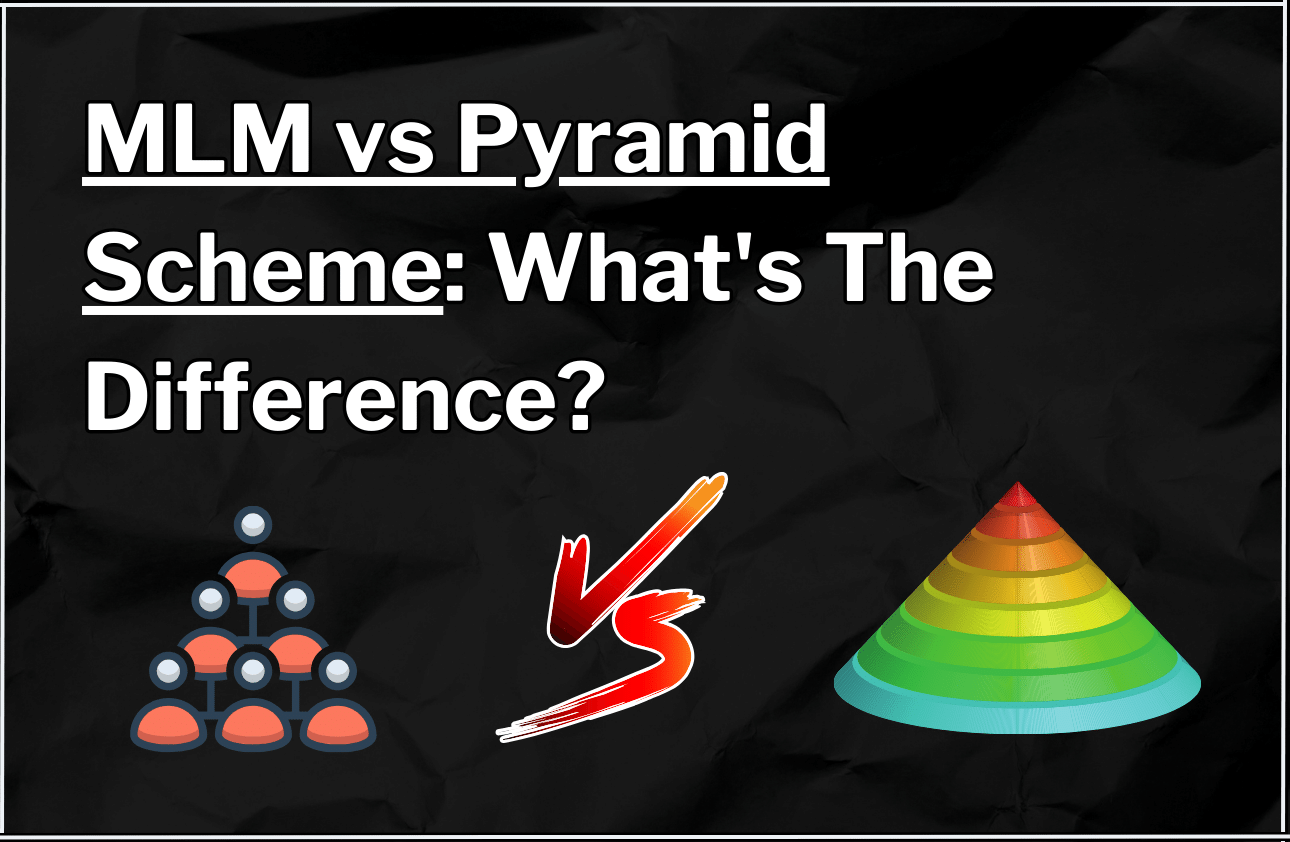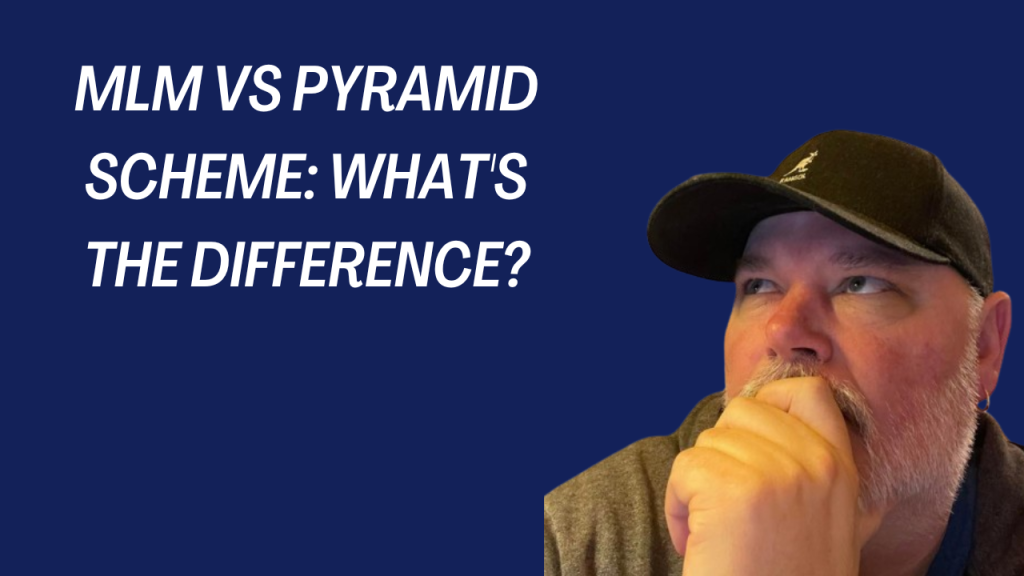MLM vs Pyramid Scheme: What’s The Difference Between Them?

While they are similar in many cases, the fact still remains that MLM’s and pyramid schemes are not the same thing. This means that it’s important to understand the ideas that separate them from one another.
Because over the years both MLM and network marketing have gotten misconstrued opinions about them because of the confusion of relating them to pyramid schemes.
MLM vs Pyramid Scheme.
We’re going to walk you through exactly what makes MLM’s and pyramid schemes similar, different, and why the MLM space should get better reception by the media.
This knowledge about these 2 structures of network marketing, come from our experience in the industry for well over 30 years.
Let’s get started…

What’s The Difference Between An MLM And A Pyramid Scheme?
The main difference between an MLM and a pyramid scheme, is the focus on how you bring in new distributors. With an MLM, you’re focusing on selling the product or services offered by a company.
With a pyramid scheme, your goal is to only bring in recruits so that they can also bring in recruits as well.
This is illegal, as companies cannot have a structure where the only focus is to recruit more people – to recruit more people.
These differences between a Multi-Level Marketing (MLM) business and a pyramid scheme lies primarily in their structure and legality.
Here’s a detailed explanation along with an example to illustrate the difference:
Multi-Level Marketing (MLM)
MLM is a legitimate business model where individuals sell products or services directly to consumers and earn commissions based on their sales.
Participants can also recruit others to join the business and earn additional commissions based on the sales made by their recruits.
The focus is on selling actual products or services, and the income potential is tied to product sales.
Examples of MLM: Amway and Greatlife Worldwide are two well-known examples of legit MLM companies. Distributors earn commissions by selling health, beauty, and home care products.
They also have the option to recruit others, earning a percentage of their recruits’ sales.
The emphasis is on product sales, and distributors are not required to recruit others to make MLM commissions.

Pyramid Scheme
Pyramid schemes are illegal and unsustainable business models that generate revenue primarily by recruiting new participants rather than selling legitimate products or services.
Participants pay to join and then recruit others, earning money from the fees paid by new recruits only.
The structure is unsustainable because it requires an ever-increasing number of recruits to provide returns to earlier participants, leading to inevitable collapse when recruitment slows down.
Because there are no additional product sales, nobody’s buying anything.
Example of a Pyramid Scheme: Imagine a scheme where individuals are asked to pay $200 to join and are promised $200 for every person they recruit.
And there are no products or services being sold, and the primary focus is on recruiting others to make money.
Eventually, the scheme collapses because there aren’t enough new recruits to sustain the payouts to earlier participants.
Again, because nobody is buying any real products.
Key Differences
- Product/Service Focus:
- MLM: Legitimate products or services are sold. Income is based on product sales.
- Pyramid Scheme: No real products or services are sold. Income is based on recruiting new participants only.
- Revenue Generation:
- MLM: Revenue comes from the sale of products/services to consumers.
- Pyramid Scheme: Revenue comes from recruitment fees paid by new participants.
- Legality:
- MLM: Legal and regulated as long as there are actual products/services being sold and participants are not required to recruit others to earn income.
- Pyramid Scheme: Illegal and often shut down by authorities due to their fraudulent nature.
Understanding these differences is crucial for recognizing legitimate business opportunities and avoiding illegal and unsustainable schemes.
You have to build a business that has customers who buy the products or services. End of story..
Pyramid schemes run off of only bringing in more distributors to bring in more distributors. While MLM’s focus as well on selling the products or services, while happening to have a multi-level payout structure to affiliates.
Usually you can distinguish between an MLM and a pyramid scheme by the copywriting, sales material, and messaging on their websites.

How Are MLM’s And Pyramid Schemes Similar?
There are a few things that both MLM and pyramid schemes have in common you should be aware of. These similarities are normal, and are all legal.
- MLM’s and pyramid schemes both are business structures based on building a downline. Since both have affiliates or “distributors” who can recruit more affiliates this is one similarity. Network marketing is also a form of MLM, and affiliate marketing.
- Both pay a percentage of total sales on multiple levels to distributors or affiliates. An MLM and a pyramid scheme both usually pay on recruited members downline. While MLM’s focus on selling product to generate commissions, pyramid schemes focus only on bringing in more people.
- Their “pyramid structure”. Yes, MLM’s and pyramid schemes both have the structure of a pyramid for how they bring in customers and affiliates. However, so does most jobs, governments, and companies as well. The structure itself is not a legal issue.
These are the 3 most common similarities between MLM and pyramid schemes that are the most important to consider.
MLM And Network marketing have been around over 100 years..And are billion dollar business opportunities.
Is Multi Level Marketing Legal To Join?
Yes, MLM’s are completely legal and ethical to join or start. Since an MLM is simply an affiliate program that pays out on multiple levels, there is nothing wrong with MLM’s.
Most MLM’s get into trouble or have issues when they start only focusing on expanding by bringing in more distributors.
MLM’s that focus on selling good products and services, that genuinely help their customers very much – never have an issue with the FTC and other governing bodies.
High quality MLM’s that are the best to join also make sure to not make any false claims about the type of income you can earn.

Are Pyramid Schemes Legal?
No, pyramid schemes are illegal and wrong. They only live off of affiliates and distributors bringing in more of their own kind.
They aren’t based off of the product and helping customers, they are nothing more than money games. Some pyramid schemes even promise returns on money spent.
Eventually they begin to fail, are unable to pay their promoters, and often do go bankrupt or get shutdown.
If you see a business opportunity where the only money being made is from the recruitment of someone, and they have no real products or services being sold and purchased, stay far away..
Final Thoughts On MLM vs Pyramid Scheme
While both MLM’s and pyramid schemes rely on the structure of affiliate marketing to generate their growth, their is much between them that is not the same.
It is important to make these distinguishments so you’re able to identify a good work from home business opportunity – vs a money grab that can leave you broke.
Consider joining only the best MLM’s that truly seem to care about the audience they are effecting. We hope you enjoyed this walkthrough of MLM vs Pyramid Scheme.
With our kindest regards,
Jon Weberg
Richard Weberg


